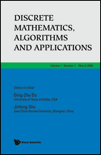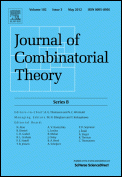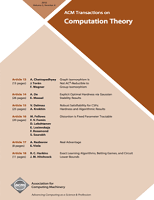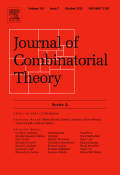
Discrete Mathematics Algorithms and Applications
Scope & Guideline
Empowering Research in Discrete Mathematics and Combinatorics.
Introduction
Aims and Scopes
- Discrete Structures and Graph Theory:
The journal extensively covers topics related to discrete structures, particularly graph theory, including properties, applications, and algorithms for various types of graphs such as bipartite, planar, and hypergraphs. - Algorithm Development and Analysis:
There is a strong emphasis on developing and analyzing algorithms, particularly in optimization, approximation, and complexity, addressing both theoretical and practical aspects. - Coding Theory and Information Systems:
Research on coding theory, including linear, cyclic, and constacyclic codes, is prominent, reflecting the journal's commitment to exploring error detection and correction techniques. - Combinatorial Optimization:
The journal features studies on combinatorial optimization problems, including domination, coloring, and covering problems, often with a focus on algorithmic solutions. - Mathematical Modeling and Applications:
There is a consistent focus on applying discrete mathematics to real-world problems, including network analysis, social networks, and operational research. - Interdisciplinary Research:
The journal encourages interdisciplinary research that connects discrete mathematics with fields such as cryptography, data science, and network theory, showcasing the versatility of discrete mathematics.
Trending and Emerging
- Machine Learning and Graphs:
There's a notable increase in research that integrates machine learning techniques with graph theory, particularly in applications like social network analysis and recommendation systems, showcasing the growing importance of data-driven approaches. - Quantum Computing and Cryptography:
Emerging themes around quantum computing and its implications for cryptography are gaining traction, reflecting the significant interest in secure communication and information processing in the quantum era. - Complex Networks and Their Dynamics:
The study of complex networks, including their structure, dynamics, and applications in various fields such as biology, social sciences, and technology, is becoming more prominent, indicating a trend towards understanding real-world phenomena through discrete mathematics. - Advanced Coding Techniques:
Research on advanced coding techniques, including applications in wireless communication and error correction, is trending, reflecting technological advancements and the need for robust communication systems. - Graph Algorithms for Big Data:
The development of efficient graph algorithms tailored for big data applications is increasingly prevalent, addressing the challenges posed by large-scale data processing and analysis.
Declining or Waning
- Classical Graph Theory Results:
There appears to be a decrease in the publication of papers focused on classical results in graph theory, suggesting a shift towards more applied or computational aspects of the field. - Basic Combinatorial Structures:
Research on basic combinatorial structures, such as standard permutations or simple combinatorial problems, seems to be less prevalent, indicating a move towards more complex or applied combinatorial problems. - Non-Algorithmic Theoretical Discussions:
Papers that primarily discuss theoretical aspects without a strong algorithmic component are becoming less common, as the journal increasingly emphasizes practical applications and computational methods.
Similar Journals

JOURNAL OF COMBINATORIAL OPTIMIZATION
Fostering breakthroughs in algorithm development and analysis.JOURNAL OF COMBINATORIAL OPTIMIZATION, published by Springer, stands at the forefront of research in the fields of applied mathematics, computational theory, and combinatorial optimization. With an ISSN of 1382-6905 and E-ISSN of 1573-2886, this esteemed journal serves as a vital platform for groundbreaking studies and methodologies from 1997 to 2024. Notably positioned in the Q3 quartile across several categories, including applied mathematics and discrete mathematics, it reflects a commitment to high-quality research that pushes the boundaries of knowledge in quantitative analysis and algorithm development. Although it does not offer open access, its visibility and impact are underscored by impressive Scopus rankings, such as the 67th percentile in discrete mathematics and combinatorics. The journal aims to foster a comprehensive understanding of combinatorial optimization and its applications, making it an indispensable resource for researchers, professionals, and students eager to stay abreast of the latest trends and advancements in these dynamic disciplines.

DISCRETE & COMPUTATIONAL GEOMETRY
Pioneering Research in Discrete Structures and AlgorithmsDISCRETE & COMPUTATIONAL GEOMETRY is a prestigious journal published by Springer, specializing in the fields of computational geometry, discrete mathematics, and theoretical computer science. With its ISSN 0179-5376 and E-ISSN 1432-0444, this journal has established itself as a key resource for researchers and professionals, offering a platform for the dissemination of high-quality research from 1986 to 2024. Recognized for its impact in the academic community, it currently holds a Q2 ranking in several important categories, including Computational Theory and Mathematics, Discrete Mathematics and Combinatorics, Geometry and Topology, and Theoretical Computer Science. Although it is not an open-access journal, the rigorous peer-review process ensures that published articles meet the highest standards of scientific integrity and scholarship. With Scopus rankings reflecting its influence—placing it in the 72nd percentile for Geometry and Topology and 62nd for Discrete Mathematics—it serves as an essential reference for students and scholars seeking to deepen their understanding of complex geometric and combinatorial theories.

Prikladnaya Diskretnaya Matematika
Advancing the Frontiers of Applied Mathematics.Prikladnaya Diskretnaya Matematika, published by the PUBLISHING HOUSE SCIENTIFIC & TECHNICAL LITERATURE in the Russian Federation, serves as a vital resource for scholars and practitioners in the realms of applied mathematics, computational theory, and discrete mathematics. With an ISSN of 2071-0410 and an E-ISSN of 2311-2263, this journal has been actively contributing to the academic discourse since its inception in 2016, with expectations to continue until at least 2024. Although currently positioned in the Q4 category across several disciplines—including applied mathematics, computational theory, and signal processing—this journal offers a unique opportunity for researchers to contribute to an evolving field, despite facing competitive rankings in the Scopus database. The open access nature of the journal reflects a commitment to disseminating knowledge broadly, albeit details regarding access options remain unspecified. As a publication dedicated to fostering innovation and collaboration in theoretical and practical applications, Prikladnaya Diskretnaya Matematika plays an important role in advancing mathematical theories and practices, making it pertinent for those engaged in research and application within these critical domains.

FUNDAMENTA INFORMATICAE
Advancing the Frontiers of Informatics and Mathematics.FUNDAMENTA INFORMATICAE is a distinguished academic journal published by IOS PRESS, focusing on the critical intersection of informatics, mathematics, and computer science. Since its inception in 1988, this journal has served as a vital resource for researchers and professionals alike, providing a platform for innovative studies in Algebra and Number Theory, Computational Theory and Mathematics, Information Systems, and Theoretical Computer Science. With an impressive HIndex, and ranking in the Q3 and Q4 categories across various disciplines as of 2023, it underscores its contribution and relevance in advancing the body of knowledge in these fields. The journal's commitment to excellence is reflected not only in its rigorous peer-review process but also in its notable rankings on Scopus, which positions it favorably among its peers. Though not yet available as an open access journal, FUNDAMENTA INFORMATICAE remains a crucial academic venue for authors wishing to disseminate their findings to a global audience, promoting collaboration and further research within the scientific community.

JOURNAL OF COMBINATORIAL THEORY SERIES B
Fostering Collaboration in Combinatorial TheoryJOURNAL OF COMBINATORIAL THEORY SERIES B, published by Academic Press Inc., Elsevier Science, is an esteemed journal within the discipline of combinatorial theory, discrete mathematics, and theoretical computer science. With a rich history since its inception in 1971 and ongoing publication through 2025, this journal has established itself as a pillar in its field, currently holding Q1 category rankings in multiple areas including Computational Theory and Mathematics, Discrete Mathematics and Combinatorics, and Theoretical Computer Science. The journal features cutting-edge research and developments, attracting contributions from both established professionals and emerging scholars. Despite the absence of an open access option, the journal's strong impact reflected in its Scopus ranks—such as being number 16 out of 92 in Discrete Mathematics and Combinatorics (83rd percentile)—signifies its influential role in advancing knowledge and innovation. Researchers seeking to share impactful findings and connect with a vibrant academic community will find the JOURNAL OF COMBINATORIAL THEORY SERIES B an essential resource.

CANADIAN JOURNAL OF MATHEMATICS-JOURNAL CANADIEN DE MATHEMATIQUES
Advancing mathematical excellence, one article at a time.Canadian Journal of Mathematics - Journal Canadien de Mathématiques is a prestigious peer-reviewed journal published by Cambridge University Press, which aims to advance the field of mathematics through the dissemination of high-quality research articles. With its ISSN 0008-414X and E-ISSN 1496-4279, the journal plays a pivotal role in fostering mathematical research and collaboration. It has been recognized for its impactful contributions, currently holding a category quartile ranking of Q2 in Mathematics (miscellaneous) for 2023 and sits in the 66th percentile among its peers according to Scopus rankings. As the journal continues its convergence from its inception in 1994 through to 2024, it remains a vital resource for researchers, professionals, and students seeking to stay at the forefront of mathematical developments. The journal does not operate under an open access model, allowing for a curated collection of articles that adhere to rigorous academic standards.

Communications in Combinatorics and Optimization
Fostering Global Collaboration in Mathematical InnovationCommunications in Combinatorics and Optimization is a prestigious open-access journal published by Azerbaijan Shahid Madani University, focused on advancing research in the fields of combinatorial mathematics and optimization. Since its inception in 2016, the journal has established a reputation for disseminating high-quality research, achieving a commendable Q2 ranking in both Control and Optimization and Discrete Mathematics and Combinatorics as of 2023. With a Scopus ranking of #13 in Discrete Mathematics and Combinatorics, it is positioned in the top 14% of its field, underscoring its significance in the academic community. By providing unrestricted access to its articles, the journal promotes the widespread dissemination of knowledge, fostering collaboration and innovation among researchers, professionals, and students around the globe. Based in Iran, the journal continues to contribute to the global discourse on effective combinatorial and optimization techniques that address contemporary challenges.

ACM Transactions on Computation Theory
Advancing the Boundaries of Computation Theory.ACM Transactions on Computation Theory, published by the Association for Computing Machinery, is a prestigious journal dedicated to advancing the field of computation theory and theoretical computer science. With an ISSN of 1942-3454 and an E-ISSN of 1942-3462, this journal serves as a vital resource for researchers and professionals seeking to explore groundbreaking developments in computational models, algorithms, and their mathematical foundations. The journal's rigorous standards have earned it a significant position within the academic community, as evidenced by its 2023 category quartiles, ranking in the Q1 category for Computational Theory and Mathematics and Q2 for Theoretical Computer Science. Although it operates through traditional subscription access, it maintains a critical role in disseminating cutting-edge research and fostering collaboration among experts in the United States and beyond. As an influential platform, ACM Transactions on Computation Theory is committed to contributing to the ongoing dialogue and advancement of computation theory, making it essential reading for anyone passionate about this dynamic field.

DISCRETE MATHEMATICS
Navigating the landscape of theoretical computer science.DISCRETE MATHEMATICS, published by Elsevier, is a leading journal dedicated to the field of discrete mathematics and combinatorics, with a distinguished presence in the academic community since its inception in 1971. With an ISSN of 0012-365X and an E-ISSN of 1872-681X, this esteemed journal has firmly established itself within the Q1 category for Discrete Mathematics and Combinatorics, and Q2 for Theoretical Computer Science as per the 2023 metrics, underscoring its pivotal role in advancing research in these vital areas. DISCRETE MATHEMATICS is highly regarded, reflected in its Scopus rankings, where it stands at #44 out of 92 in its primary category, contributing significantly to the global discourse on complex mathematical theories and applications. Published from the Netherlands, the journal serves as a crucial resource for researchers, professionals, and students looking to stay informed about the latest innovations and methodologies in discrete mathematics. Though currently not an open-access journal, DISCRETE MATHEMATICS continues to foster a vibrant scholarly community through rigorous peer-reviewed research, promoting a deeper understanding of the mathematical structures that underpin both theoretical and applied science.

JOURNAL OF COMBINATORIAL THEORY SERIES A
Exploring Innovative Pathways in Theoretical Computer Science.JOURNAL OF COMBINATORIAL THEORY SERIES A, published by Academic Press Inc. Elsevier Science, stands as a pivotal platform for researchers in the realm of combinatorial mathematics and theoretical computer science. With an impact factor that underscores its influence and a well-respected reputation reflected in its rapid ascent to Q1 rankings in discrete mathematics and computational theory, this journal serves as a critical resource for academics seeking to advance their understanding of complex combinatorial structures and algorithms.
Founded in 1971, the journal covers a wide spectrum of topics within combinatorial theory, providing a robust forum for innovative research and theoretical advancements until 2025. Including a strong position in the Scopus rankings—notably, it ranks #10 out of 92 in discrete mathematics—the journal is essential for both emerging scholars and established professionals committed to pushing the boundaries of mathematical and computational inquiry. Researchers are encouraged to submit their findings to this esteemed publication, as it offers a non-open-access model that ensures rigorous peer review and high visibility within the academic community.